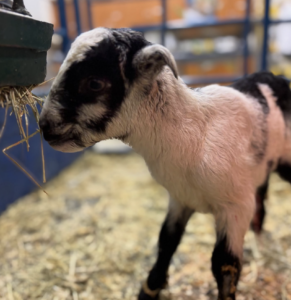By Tara Fischer
Staff Writer
Worcester Technical High School’s live stream, called the “Kidding Kam,” is offering agricultural students a deeper dive into the intricacies of animal health this semester.
The Kidding Kam is a project spearheaded by the WTHS agricultural program to provide students with a deeper look at the labor process of goats. A press release by Worcester County Public Schools announcing the initiative says that the endeavor is in partnership with the University of Maryland Extension and allows students to manage and help the animals as they prepare to “kid out” or give birth.
The Kidding Kam has been featuring two pregnant does, or adult female goats, named Faith and Samantha. Faith is recognizable by her brown and white coloring, while Samantha is dark brown, almost black, and white. The animals are being housed in the WTHS’s agricultural lab.
Worcester Tech’s IT Department and Digital Audio Pro-
gram have created a livestream to allow students to check in on the animals when they are not in school. Community members can also join in on the fun by going to https://youtube.com/live/B1RB_an2UBE?feature=share.
Last week, Faith delivered two baby goats, a boy and a girl, right on her due date of March 26. WTHS announced the twins’ birth on Facebook, describing each kid.
The male is black with brown legs and long ears, while the female is black and white with “elf ears.” The social media post maintains that the elf ears are normal and are a result of genetics. The update also adds that the students were keeping a close eye on the livestream and could give their teacher a heads up when the doe’s water broke.
Samantha is still expecting. Her due date is April 12.
The school system’s press release provides details on the goat kidding process to provide further information and spur community involvement. Some highlights include the fact that it’s normal for does to have twins or triplets every time they give birth, like in the case of Faith, who had twins last week, and that expectant birth signs are softening above the tail head, stretching while laying down, and a dropped low abdomen.
The interactive program benefits the young learners, as many of the students enrolled in the tech school’s agricultural program hope to one day have a career in veterinary sciences.
“This project gives [students] hands-on practice with animals that are not only mature but dairy animals that are in a production stage and keeping young animals healthy,” said Jessica Flores, WTHS’s agricultural teacher.
Flores maintained the project teaches students the accountability involved in supporting the health of animals. Each day, they are assigned to feed and water the goats, clean the pen, and complete daily health care checks.
“The students learn how much responsibility is required in taking care of and maintaining good animal welfare and wellbeing,” the agricultural teacher said.
Some planning was needed to get the project off the ground. According to Flores, the students were to be prepped on the details of doe labor and health to ensure they could keep a watchful eye on the animals.
“Students must be knowledgeable of goat behavior and learn the signs of parturition, the act of giving birth, to be on the lookout,” the teacher noted.
Flores added that the Kidding Kam was made possible with the help of Program Advisory Members of the University of Maryland Extension and the Berlin-located Rusted Star Ranch for offering animals and supplying bedding and expertise.
The educator mentioned that the WTHS has had animals in its lab for past student projects. However, the Kidding Kam is the first to offer a live feed.
“It’s addictive and fun,” Flores said.

